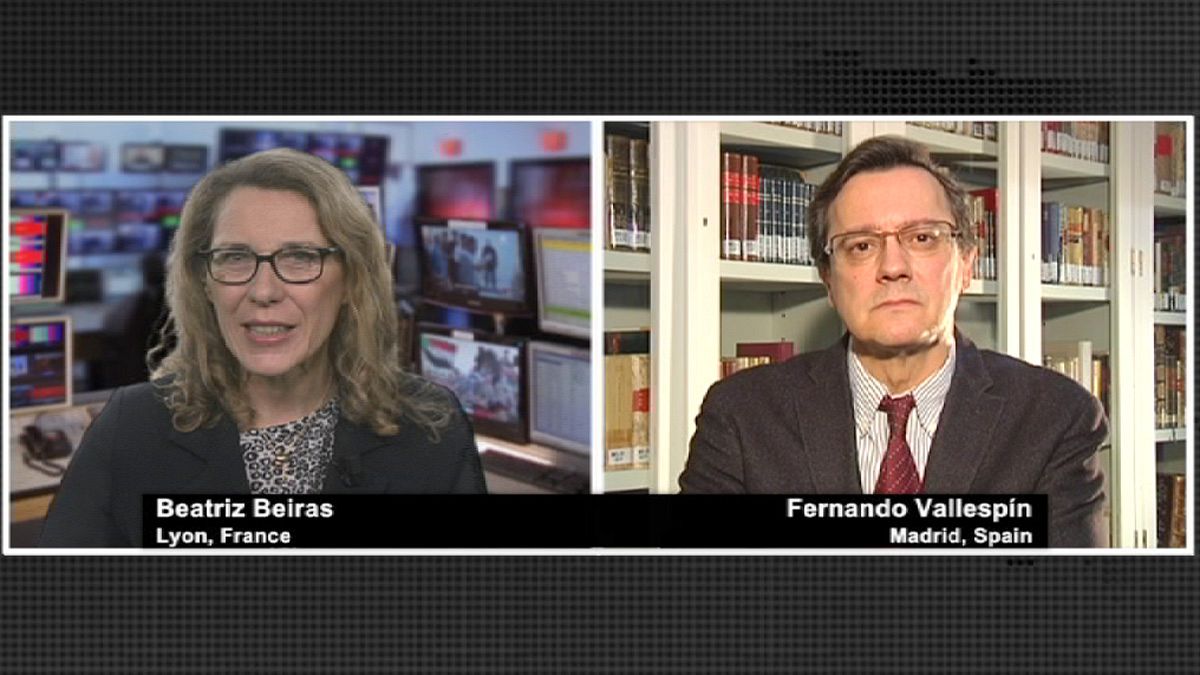In this News Plus, we take a look at Spanish Prime Minister Mariano Rajoy’s precarious position – the man who reached the pinnacle of his career on an unexciting image of honesty and prudence:
First relevant facts, then an interview with an analyst.
Many Spaniards believe the allegations, that highly-placed politicians may be involved in a massive new corruption scandal, which comes at a very bad time for Spain.
Rajoy is facing an unprecedented crisis of national confidence. In response to allegations of political corruption within the ruling People’s Party (PP), he broke silence on Saturday to defend his reputation.
He would not respond to questions from the media but he rejected that he himself had any part in an alleged slush fund.
Rajoy said: “I do not need more than two words: ‘It’s false.’ I have never received or handed out ‘black money’, never in this party or anywhere else. I will say it again: it’s false.”
The scandal dubbed ‘the Barcenas affair’ blew up on January 18.
Major newspapers published assertions that former PP treasurer Luis Barcenas had handed out envelopes with thousands of euros in cash to members in the party – cash provided by private companies for more than a decade. El Mundo said Rajoy did not get any.
But last Thursday, El Pais published handwritten accounts which, it suggested, showed that Rajoy received more than 25,000 euros per year between 1997 and 2008.
On Sunday, the Socialist opposition leader Alfredo Perez Rubalcaba demanded that the prime minister resign:
“We ask him to quit as head of government and to give way to another who can restore the strength, credibility, and stability that our country needs.”
With more than 26 percent unemployment and austerity measures squeezing ordinary Spaniards, Rajoy’s promise to reveal his tax declarations did little to defuse the crowds’ anger.
Protestor Miguel Gomez said: “It is not enough to show his income tax, because we are talking about undeclared money. What we need is his resignation, because those in public positions should set an example – and they are doing exactly the opposite.”
Corruption scandals among the country’s privileged include the son-in-law of the King, Inaki Urdangarin.
He is scheduled to appear in court for a second time later this month, accused of misuse of millions of euros in public funds.
We spoke with Fernando Vallespín on these related matters; he is a political science professor at the Autonomous University of Madrid, a former head of the Sociological Research Centre and also a contributor to the El Pais newspaper.
Beatriz Beiras, euronews:
“The leader of the Socialist opposition, Alfredo Perez Rubalcaba, asked Prime Minister Mariano Rajoy to resign – to hand over power to another head of government. Do you see things this way, or can the People’s Party’s absolute majority save Rajoy?”
Fernando Vallespín:
“I don’t think the PP’s absolute majority is enough to save him in the position he occupies today. On the other hand, resignation might be a bit hasty. I think he should be allowed a measure of presumption of innocence.
“Rajoy has categorically denied the allegations. He has taken responsibility, not only for his own actions but for his party as a whole, so we will have to see how this will impact his position.
“Today it is obvious that many of the things unveiled by the press have turned out to be true, this makes things really complicated for Rajoy.”
euronews:
“The scandal triggered by the El Pais revelations on the alleged payments to PP leaders has erupted in the middle of an economic crisis, with millions of Spaniards out of work, and with the King’s son-in-law, Inaki Urdangarin, under investigation for embezzlement. Is Spain facing an institutional crisis that is also affecting the monarchy?”
Vallespín:
“There is no doubt about it: Spain is in a serious institutional crisis, brought about and accelerated by the crisis conditions you’ve mentioned.
“Unemployment in Spain has been getting worse for several years; the social predicament in some sectors is almost unbearable; and trust in the institutions, including political parties, has fallen drastically. These corruption cases are surfacing in a climate of discomfort that is much more far-reaching than the scandals themselves.
“You’ve also raised the Urdangarin case, that’s important. I think that there will be a before and after Urdangarin in Spain, in terms of assessing corruption, and that from now on there is going be to zero tolerance for this kind of conduct. We can claim a moral conscience today that is as developed as that of the Scandinavians, that we might see in those countries if they had this sort of public ethical problems, and that’s an enormous problem for the PP. The people will not put up with any more cases like this; they are demanding justice. People want explanations right now.”
euronews:
“To conclude, can we say that the historic stage of transition which followed the dictatorship of Franco is over?”
Vallespín:
“Yes, categorically. We are at the end of a cycle. Spanish democracy has to reinvent itself also to a large extent because there are challenges, such as the Catalan independence movement, that is calling for a revision of our constitution. Our constitutional pact has lasted a little more than 30 years. I believe now is the time to seek consensus around a new one, and to lay down new foundations for what should be a new phase in Spain’s still young democracy.”
